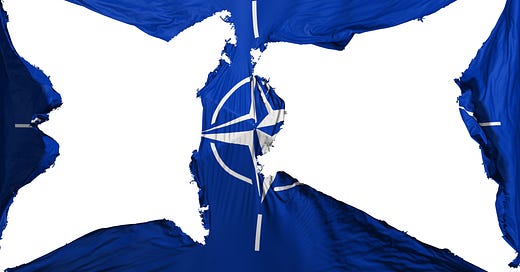Trump's Chaos Will Have Global Consequences
America First turns out to be a recipe for American irrelevance
President Donald Trump says a great many things. Well, at least he says many things. Deciphering his intentions—with his tariffs on Canada and Mexico, tariffs on aluminum and steel, and on the ethnic cleansing of Gaza, for example—is another matter. However, his impulsive, uninformed, erratic pronouncements come at a cost. Gradually, friends and enemies alike will learn to ignore him; worse, they may miscalculate his true intentions, leading to aggressive moves by foes, conflicts with allies, economic disruption, and even violent conflict.
On Trump’s chaos, the Wall Street Journal reports:
“The end goal seems to be an economy with a smaller role for imports, immigrants and the federal government and a bigger one for private investment….But the execution has generated intense uncertainty—among business owners, workers and trade partners—that could damp growth, at least temporarily.”
When it comes to tariffs, The Contrarian contributor Paul Krugman writes,
“Never mind that he blinked, at least so far. (He is, as I write this, saying that he will impose a new set of tariffs on steel and aluminum, which would, if they happen, hit Canada in particular.)” He continues: “We have a trade agreement with our neighbors that specifically rules out unilateral tariff increases and calls on members to go through a dispute settlement process instead. Trump personally signed a minor revision of that deal in 2018. So now we’re a nation that doesn’t keep its word, that can’t be trusted to honor its agreements.”
Trump’s chaos creation may also impact the Federal Reserve. “The trade posturing could also have ramifications for inflation, with the potential to push prices higher. That, in turn, could influence where the Federal Reserve takes interest rates in the coming months—and years,” Yahoo Finance reports.
The targets of tariffs could take retaliatory action, which may not be easily reversed, even if Trump blinks. “Chinese officials are building a list of U.S. technology companies that can be targeted with antitrust probes and other tools, hoping to influence the tech executives who are heavily represented in President Trump’s orbit,” the Wall Street Journal reports. “People familiar with Beijing’s strategy said the goal was to collect as many cards as possible to play in expected negotiations with the Trump administration over U.S.-China issues, including the tariffs that Trump has imposed on Chinese goods.”
And businesses, more than tax cuts or regulatory rollbacks, need stability and predictability. Do they hire people in the U.S.? Set a plant up overseas? Enter into deals with new suppliers? In the end, they may choose to do none of the above—a choice that itself has economic ramifications. “The lingering threat of substantial new tariffs and possible retaliation from Canada and Mexico on U.S. exports will cause many businesses small and large to hold back more on hiring and investing than they would have otherwise due to the elevated uncertainty,” said Scott Anderson, chief U.S. economist of BMO Capital Markets.
In highly integrated North American markets such as the auto industry, Trump’s antics cause “[u]ncertainty, instability, chaos,” according to Canadian unions. The potential for delinking from the North American trade zone, which Trump renegotiated in his first term, would result in layoffs, plant closings, and higher prices. As investment advisers build in lower growth and stock market volatility, business expansion may take a hit. (Consumer sentiment is already souring.)
In the foreign policy realm, where the words, threats, and promises of the United States president must be taken seriously, Trump has frittered away what little credibility he had. We are left to wonder if his threats to take over the Panama Canal might result in a diplomatic, economic, or (God forbid) military conflict. Announcing a plan to permanently displace Palestinians from Gaza, if taken to heart, could short-circuit the hostage deal and reignite hostilities. Would the Palestinians, not to mention the Saudis or Jordanians, want to help rebuild Gaza while Trump sows discord, uncertainty, and confusion? (Good luck with any grand bargain between Saudi Arabia and Israel if Trump’s ultimate plan is to deny Palestinians any right of self-determination.)
As for the Ukrainian War, Russian President Vladimir Putin may be convinced that Trump will eventually sell out Ukraine. Why, then, should he stop fighting or make any concessions? Meanwhile, Ukraine—which will need security guarantees when the fighting stops—can hardly rely on Trump to come to its rescue. Trump’s bellicosity makes both sides less amenable to compromise.
In sum, Trump’s erratic, bellicose pronouncements do not make Americans safer, nor do they enhance our influence in the world. To the contrary, Trump is teaching friends and foes alike to ignore us, work around us, and look to others for leadership.
America First turns out to be a recipe for American irrelevance.






Puts it in a nutshell, Jen. The nutjob is running a country on whims and guesses. His track record tells us he often, many times, is wrong. But now we suffer.
Already has.
Inflation is surging. Gas prices are rising. MAGAots heads are firmly entrenched in tRumps ass. (sigh)